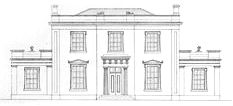Age
Elinor is 19 years old at the beginning of the novel.
Family and Situation
Elinor Dashwood is the eldest daughter of Henry Dashwood by his second wife, Mrs. Dashwood. She is sister to Marianne and Margaret Dashwood and half-sister to John Dashwood, and thereby related to his wife Fanny and their son, Harry.
As a girl, Elinor would have moved with her family from Stanhill to Norland Park when her great uncle invited her father to come live at the estate he would one day inherit.
Elinor has £1,000 from her Uncle Dashwood, as a concession for being so entirely cut out of the Norland estate. Though her father had intended to provide for her, he had “only seven thousand pounds in his own disposal” and died before he could save more from the earnings of Norland Park. In conversation with Marianne, Elinor states that she considers “wealth” as beginning around £1,000 per anum.
Elinor is very close to her mother and sisters. We know that “Mrs. John Dashwood had never been a favourite with any of her husband’s family,” but Elinor does seem to tolerate John with relative equanimity.
Connections
Because she is so polite, Elinor maintains acquaintances with a wide range of characters, regardless of her feelings for them. For instance, she spends much of the novel bearing the secrets of Miss Lucy Steele who we know she does not care for.
We do know that Elinor genuinely likes Colonel Brandon’s company and that, early in the novel when Marianne has written him off as an old man, “in spite of his gravity and reserve, [Elinor] beheld in him an object of interest.”
Appearance
While we are told that Marianne is the handsomer of the two sisters, the narrator says that “Miss Dashwood had a delicate complexion, regular features, and a remarkably pretty figure.” We do know that Elinor is shorter than Marianne.
Due to the confusion about whose hair is in Edward’s ring, we also know that Elinor’s hair color is lighter than Fanny Dashwood’s and likely fairly close to Lucy Steele’s.
Character
In the most simplistic reading of the novel, Elinor represents all of the titular Sense. The narrator says that she “possessed a strength of understanding, and coolness of judgment, which qualified her, though only nineteen, to be the counsellor of her mother, and enabled her frequently to counteract, to the advantage of them all, that eagerness of mind in Mrs. Dashwood which must generally have led to imprudence. She had an excellent heart;—her disposition was affectionate, and her feelings were strong; but she knew how to govern them: it was a knowledge which her mother had yet to learn; and which one of her sisters had resolved never to be taught.”
Over the course of the novel, one of Elinor’s greatest traits is a level head under pressure. Early on, we are told that Elinor observes the anguish Marianne and her mother go through because of her father’s death but that, while she too mourned, “she could struggle, she could exert herself. She could consult with her brother, could receive her sister-in-law on her arrival, and treat her with proper attention; and could strive to rouse her mother to similar exertion, and encourage her to similar forbearance.” This trait comes to the fore again in the novel when Marianne is deathly ill; Elinor arranges for her medical care, tends to her bedside and manages Willoughby’s midnight call, all without a grand emotional show.
Habits and Accomplishments
We are told that Elinor is artistic and she seems to have some talent and pride about her work. Edward once jokes that if the Dashwoods were to encounter a fortune, Elinor “would give a general commission for every new print of merit to be sent” to her. We also discover at the John Dashwoods’ rented house that John or Fanny has mounted screens that Elinor painted in their dining room; though this may have been artifice for the purpose of helping her to “catch” Brandon on a particular evening, the room’s consensus that they are quite pretty suggests that she has some talent.
This activity also seems to provide emotional solace; when Edward leaves Barton Cottage without explaining his coldness on a call, Elinor sits at her drawing table and channels her emotions into her work.
We also know that art is Elinor’s primary feminine accomplishment. The narrator tells us that “Elinor was neither musical, nor affecting to be so.”
